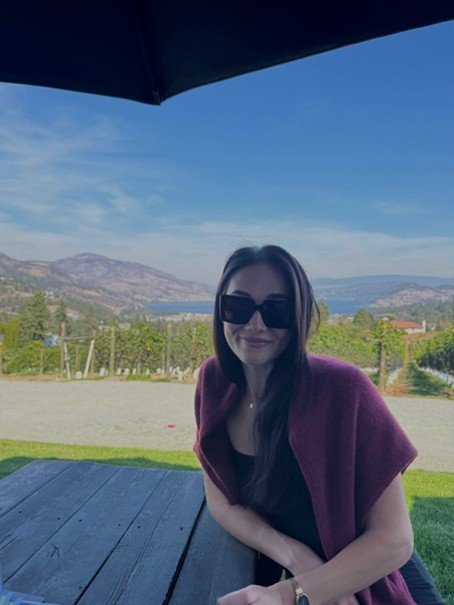Mya Dockrill’s Lab Exchange at UBC Okanagan Slumber Lab
This fall, I had the wonderful opportunity to take part in the Consortium’s Lab Exchange Program with Dr. Elizabeth Keys and her research team (SLUMBER Lab) in beautiful Kelowna, British Columbia. This experience was both inspiring and enriching. Over the course of one week, I deepened my understanding of knowledge translation (KT) with equity-deserving populations and walked away with a draft of a KT plan for my third and final dissertation study.
The Facts
Who? Mya Dockrill, PhD Student in Clinical Psychology, Dalhousie University
Supervisor: Dr. Penny Corkum, Corkum LABS
What? Canadian Sleep Research Consortium Lab Exchange Program
When? September 2025
Where? University of British Columbia – Okanagan (SLUMBER lab) and the Sleep Health Equity Team
Partnered Investigator: Dr. Elizabeth Keys
Why? To receive training in how to develop knowledge translation plans for research with equity-deserving populations that I will carry with me as I complete my PhD dissertation
Learning How to Share Sleep Research in More Inclusive Ways
My current research focuses on improving the Better Nights, Better Days sleep intervention to better meet the needs of families from equity-deserving backgrounds. My final dissertation study aims to (a) identify which components of the intervention need adaptation, and (b) create KT tools that helps researchers, clinicians, and families understand how to make sleep interventions more inclusive and culturally informed.
During my time with the SLUMBER Lab, I focused on refining the KT component of this study. Dr. Keys’ expertise in equity-focused and integrated KT complements my supervisor’s (Dr. Penny Corkum) expertise in general KT and pediatric sleep interventions, allowing me to bridge both perspectives to strengthen my dissertation’s impact.
A Week of Learning and Collaboration
Upon my arrival, I was welcomed warmly by the SLUMBER Lab team with a five-day schedule with learning opportunities and collaboration.
Day 1: I attended a kick-off workshop led by Dr. Keys on building KT plans. The workshop encouraged hands-on learning and reflection on how equity can be embedded throughout the process. I also completed two online modules on KT (Introduction to KT and How to Prepare a KT Plan), available in the open access Raising Interdisciplinary Scientist Excellence Learning Management System (RISE LMS).
Days 2 & 3: I met one-on-one with Sleep Health Equity and/or SLUMBER team members: Dr. Jelana Komanchuk (Postdoctoral Fellow), Mahtab Matin (PhD Student), Nikki Soroush (MA Student), Tai-Lin Michon (Research Coordinator), and Lisa Yang (MA student). I learned how KT is used in their research and was showed creative, non-traditional KT efforts such as VideoScribe animation, podcasts, and blog-based dissemination which the lab has successfully used.
Day 4: I attended a graduate nursing program guest lecture on Ethics and Quality in Qualitative Research that highlighted the relationship between ethical practice and principles of health equity, diversity, and inclusivity, in qualitative research. I also received a tutorial on how to use VideoScribe for my own KT projects.
Day 5: The week concluded with a visit to the Kelowna Golf and Country Club to listen to Syilx Elder and mentor for the SLEEP IN FOSTER AND KINSHIP CARE (SEEN) research team, Maureen Ziprick, share knowledge about moving forward with Truth and Reconciliation. I also toured the UBC Okanagan campus.
Throughout the week, I worked on developing a comprehensive KT plan for my dissertation study, integrating the lessons and feedback from the workshop and consultations with lab members. On the final day, I had the opportunity to present my KT plan to the SLUMBER Lab team, where I received meaningful feedback that will help share how I mobilize my research findings for my dissertation.
Looking Ahead
The knowledge and skills I gained during the exchange directly supported the advancement of my dissertation. I am especially excited to use what I learned to share my research findings through both traditional and non-traditional KT methods (including digital storytelling and animation) to reach researchers, clinicians, and families from equity-deserving backgrounds. As I return to Corkum LABS in Halifax, I carry forward a wealth of knowledge on effective KT focused on research with equity-deserving populations. This exchange provided me with valuable, hands-on experience that will share how I recruit, collaborate with, and share findings among diverse communities.
I am grateful to the Consortium for supporting this Lab Exchange and to Dr. Elizabeth Keys and her team for their mentorship and generosity. This experience has been an essential step in strengthening both my dissertation research and expertise in KT for advancing health equity.




